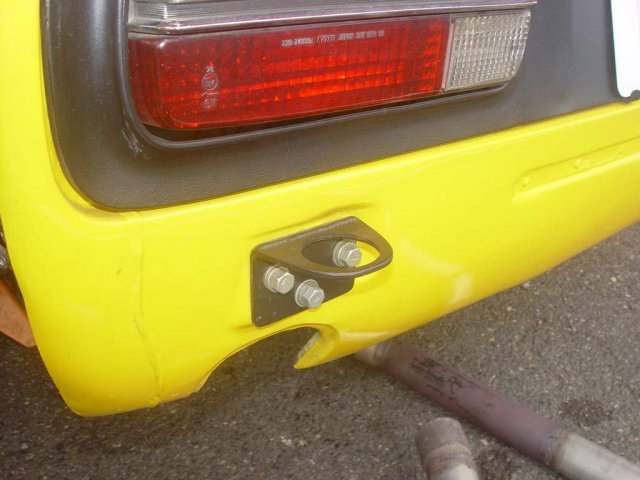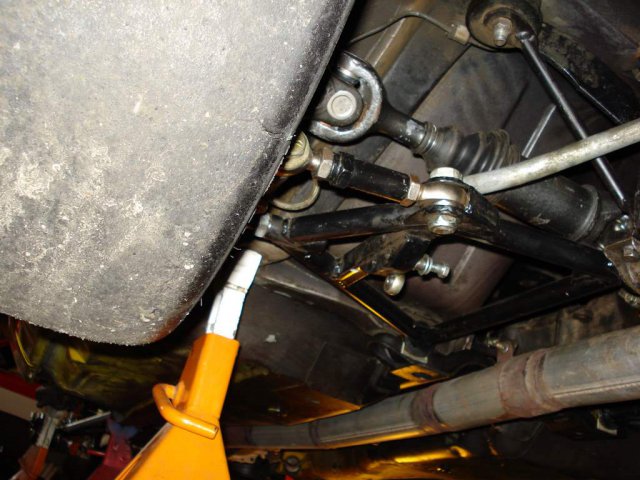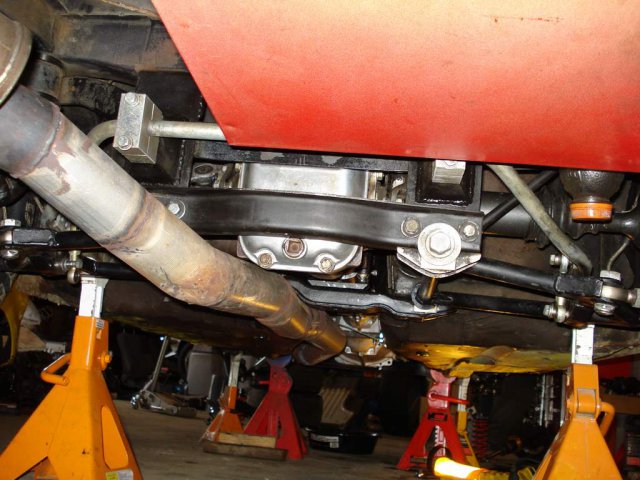
tube80z
Super Moderators-
Posts
1401 -
Joined
-
Last visited
-
Days Won
31
Content Type
Profiles
Forums
Blogs
Events
Gallery
Downloads
Store
Everything posted by tube80z
-
Even the good stuff breaks
tube80z replied to mark's topic in Brakes, Wheels, Suspension and Chassis
Sorry, I totally blew that one. They also work really well when pulling the car out of a certain pond at the end of certain track ... but I don't need to say anymore about that. Cary "three times is too many" -
Even the good stuff breaks
tube80z replied to mark's topic in Brakes, Wheels, Suspension and Chassis
They are the same arms that were in one of the construction threads from a couple of years back. I have the toe-link at the rear but they are very similar to your. Cary -
Even the good stuff breaks
tube80z replied to mark's topic in Brakes, Wheels, Suspension and Chassis
On a 240 be very careful hooking into the rear suspension. When I started making some toe-link control arms I found a number of these had been bent from being hooked to and cranked down. The 280 arms are much stronger but after seeing this I built toe hooks like Jon mentioned to be able to quickly tie the car down. Cary -
One thing to think about is you can add a lot of weight with wheels, tires, and brakes. Those add up quicker than some of the suggestions already given. Cary
-
Some showroom stock racers I knew years ago told me they stitched because you can pull the damage back out. With just spot welds the parts often split making it impossible to do. So I also don't understand why you wouldn't want to have things welded up front and in back. cary
-
Shock Adjustment for Understeer - Time Attrack
tube80z replied to 260DET's topic in Brakes, Wheels, Suspension and Chassis
If this corner is at the end of a straight your tires will cool down. Using the brakes really hard will help get them back up to temp. If you don't have them at the operating window you may chase your tail thinking it is a shock tuning/geometry issue. Cary -
Adjusting Caster via Radius Rods
tube80z replied to Whittie's topic in Brakes, Wheels, Suspension and Chassis
You can go the old school route and used a captured spherical in place of the stock lower control arm bushing. I'd bet someone locally does those and it should be a lower total cost. Cary -
240Z Chassis prep / reinforcements
tube80z replied to Kurai's topic in Brakes, Wheels, Suspension and Chassis
-
I can't count the times I've almost ran over another car towing and trying to get up to speed to merge on a short onramp only to have someone barely moving or stop at the end. Cary
-
I drove back from Alaska and found the drivers from BC nuts. Passing on blind corners, into tunnels, etc. This was all out in the middle of nowhere but it was always plates from BC. Cary
-
DCOE 45 on race car...pushing fuel out air horn.
tube80z replied to MNDATSUN's topic in Fuel Delivery
It's odd to hear fuel running out the throat. In my experience a high fuel level will cause problems with both barrels not just one. And generally you'll have fuel coming our the air vent hole too. If you run the car when it's stationary can you see this? Things I'd check are the acceleration pump circuit (make sure one isn't leaking after they squirt) and make sure the choke circuit is turned off (I seriously doubt this has anything to do with the problem). Check your gaskets as sometimes they do fail and cause leaks. Also make sure the venturi is properly seated. A loose grub screw will allow the barrel to rotate but you'll generally have an issue with the car missing if that happens. You didn't mention anything in our post about that. Everything works fine except for the leak? It also sounds like you have other things to look for too. Cary -
S130 Suspension Tech
tube80z replied to Smokescreen's topic in Brakes, Wheels, Suspension, and Chassis
The penultimate and ultimate crossmembers were something I did the design work on many years ago. We were racing 510s then and wanted to reduce the rear camber gain to try and keep the wider tires flatter to the ground. Almost all of the tech that was figured out is in this thread. The big thing we found was that you wanted to try and keep the rear trailing arm level or close to level so the camber and toe didn't change as much. The trailing arm angle changes both the toe and camber curves as well as RC position. At least on the 510 the suspension seemed less sensitive to camber being changed on the inner pickup. I would expect the 280ZX to be similar but that should really be verified. Cary -
S130 Suspension Tech
tube80z replied to Smokescreen's topic in Brakes, Wheels, Suspension, and Chassis
Please note I have deleted a number of posts from this thread that didn't appear to add any value to a really good thread. I would like to ask that we try and keep on topic so it ranks very well in search engine relevance. -
Actually I had a similar problem and when I started running limiters and it helped to fix this. The pics Jon has shown plus a number of others were showing the car on the inside edges of the inner tires. The limiters helped keep the inner tire flatter to the road (look at the yellow car example, which was the original car wear all this was tried out). Up until that point I was continuing to de-camber chasing tire temps and was seeing similar wear issues. I would at least test this to see if it helps. Cary
-
Mine were flipped, turnbuckle mounted on top so it wouldn't move and the cable on the bottom. Nothing ever showed signs of touching anything rotating. Cary
-
Doh -- what a dumb ass thing to say All I can say is that with how Jon has them there's not been any issues on a number of cars setup similar. Even at full bump there's not much room for these to move. We're talking 400 to 600 pound spring rates. For softer cars that could be a problem. You could always use a small tension spring to keep them pulled a certain way, which is what I did on some brake lines I worried about. Cary
-
This will all be under tension so it won't rattle around. Cary
-
I think the issue with it for us is the RC would be way too high. Maybe good for a SUV not so good for a sports car. Cary
-
Yet another Rear control arm design
tube80z replied to tholt's topic in Brakes, Wheels, Suspension and Chassis
Looks good Jon. I used rod end spacers against the struts on mine and safety washers on the outer ends just in case. I hope you have better luck with the slot gap bearings but we needed to change to real three piece rod ends as the others were sloppy after one weekend of use. Cary -
You can run cables or you can build a frame that pivots at the back and everything bolts to this. You can even use that idea to independently set ride height and splitter height. I have a really cool video somewhere of the tripple 8 Ford falcon's setup (aussie V8) and how it worked. The other car was Morgan Smith's. He also road raced his car and commented how much more planted the nose was in higher speed corners. It was solidly mounted and would occasionally rub the ground fairly hard. Cary
-
I have experience with two Z cars that ran splitters. Both were quicker with them than without and neither had problems with porpoising. The level of downforce that we generate is a lot less compared to a sports racer that has a flat bottom and front and rear diffuser sections. I think your idea will work but I'm not sure I'd spend too much effort on it based on my past experience. In both XP and EM you can't run a diffuser section on the splitter and this is what seems to increase the pressure gradient and cause the bouncing. I would recommend that you make the splitter so that it is hinged and can move up when it comes into contact with the ground. That will save a lot of wear and if you do it right you can even leave it on while loading on a trailer. Cary
-
Justin Hodges (280ZForce) LCA's
tube80z replied to RB26powered74zcar's topic in Brakes, Wheels, Suspension and Chassis
I think you're right after looking at the larger pics. I just have no idea why someone wouldn't have put the plates next to the tubes. Cary -
Justin Hodges (280ZForce) LCA's
tube80z replied to RB26powered74zcar's topic in Brakes, Wheels, Suspension and Chassis
In looking at the detailed pics I'm not sure it was crossing a gap. I really think this was an attempt to strengthen the piece. In addition to closing the back of the tab I'd add gussets from where the clevice connects to the base of the triangle. That should stiffen up the area and reduce any bending of this section of tube. The rod ends used for his are very low quality. I can tell you from personal experience (having built a few sets of these myself) that these will quickly wear out if they are not quality three piece rod ends (no slot gaps either). I'm also not sure of the bolt is the correct length to have only the shank loaded. I would make sure of that too. Cary -
Years ago Pirelli had something similar in F1. I remember reading about it in the old autoweek newspaper format. I also remember two compound tires and other odd things being tried. I also remember my early BFG autox tires had two different sidewall stiffnesses, which is sorta similar. Cary
-
Pressing out the spindle pin
tube80z replied to olie05's topic in Brakes, Wheels, Suspension and Chassis
Make sure to use a liberal amount of anti seize when you put it back together. Even a 5/8 bolt can get stuck over time. Cary


